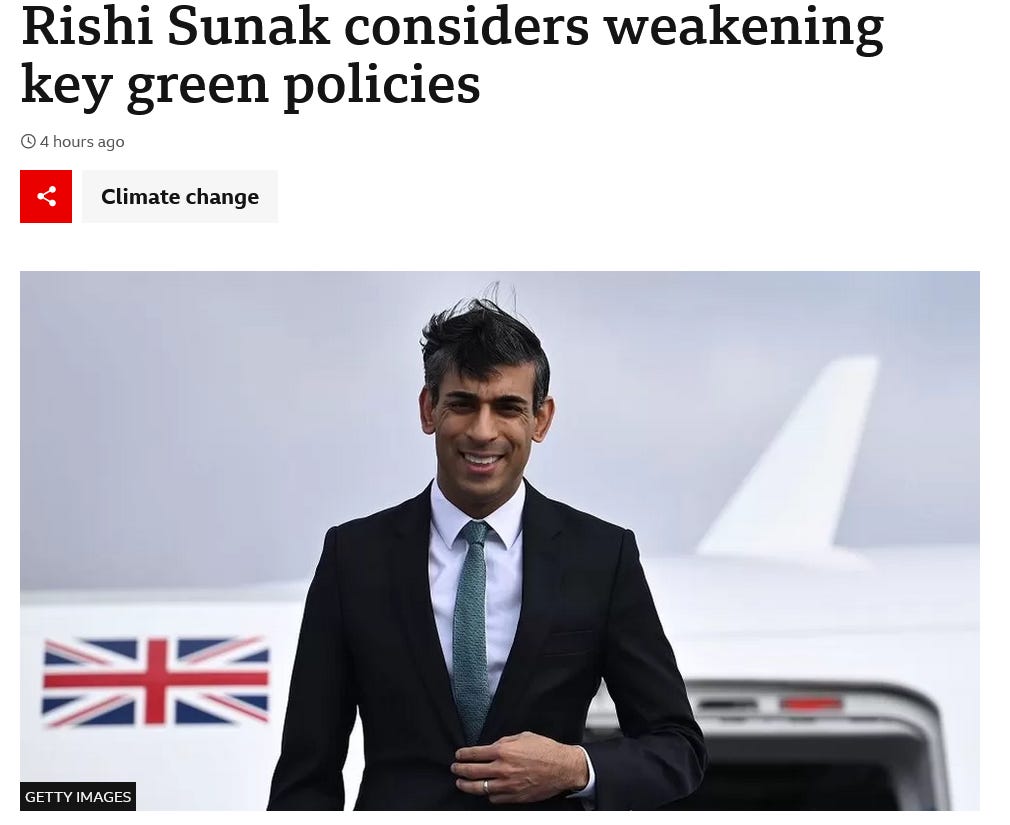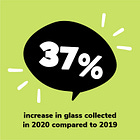Changing behaviours
We need change to start at the top - with how political leaders talk to us about the climate crisis.
It’s taken me a few days to get round to writing this.
That’s largely because of the anger that’s consumed me since the middle of last week.
I decided that wouldn’t translate well into anything you’d want to read.
That rage - and it was as intense as anything I’ve felt for quite some time - was directed at our Prime Minister, and his announcement last week of delays to a series of measures which were in place to help us to meet our net zero goals.
I wrote a short piece on the day that the news was leaked - before we’d seen the detail, focusing on his often-repeated line about the need to act proportionately to the biggest crisis we have ever faced.
I argued that if we were acting proportionately, we’d be on a war footing. In the words of the UN Secretary General, we’d be doing everything, everywhere, all at once.
There are so many things that are so obviously wrong in what happened last week - and plenty of people far better qualified than me have gone into detail on that over the past few days, so I won’t repeat all those arguments here.
Instead I’d like to focus less on what has been done, but instead on how it’s been done, and how it’s all been communicated.
It’s this - the way that the issues and the policy changes are presented to us - that really gets to me.
And here’s why.
This is far too serious a problem to be reduced to yet another line of attack in an endless culture war.
Yet politicians know full well that the climate crisis is perfect culture war fodder.
Because so much of what we need to explore in relation to the climate crisis is connected in one way or another to our sense of identity.
Who we are. How we see ourselves. How we want to be seen by others.
If you challenge me on how I travel around my city, or how many times I fly abroad, or how much meat I eat, I am very likely to take this quite personally.
The conversation is unlikely to be a constructive one.
You’re challenging my sense of who I am.
And as I’ve written previously, these conversations can be difficult.
Challenging conversations
I laid myself down on the exercise mat and closed my eyes. I was early for the class — it’s a popular one and you need to get there handy to bagsy a good spot. It was nice just to have a few minutes, as others arrived, set themselves up and chatted about this and that.
Politicians have to do better
Many of us, as I’ve outlined above, feel pretty sensitive about a lot of things relating to the climate crisis. And alongside this, there’s another major issue.
A lack of trust.
We aren’t sure quite who to believe, or what to believe.
And this is where politicians have a real responsibility to not make things worse.
Yet here’s a tweet from last week from the Prime Minister.
He basically made a load of stuff up.
The PM gave the very clear impression that these were things that were going to happen - and which he, as Prime Minister was putting a stop to.
That’s misleading.
In relation to the biggest issue of our time, the Prime Minister has chosen to gaslight us.
All of this makes subsequent conversations on these topics more difficult
This is what bothers me the most.
I’ve done a lot of work over the last few years on a range of environmental behaviour change campaigns.
And I’ve hosted many conversations on difficult topics - such as what we eat, how we travel, or how we spend our money.
And I’ve worked hard to try to make those conversations respectful and constructive.
I’ve recognised that not everyone thinks the same as me.
Whilst - as I’ve outlined above - also appreciating that they’re often sensitive, hot-button topics (and therefore perfect for political culture wars).
So each time these topics aren’t explored sensitively, by a politician, or by a journalist or someone else in the public eye, it makes it harder for all of us as citizens to work this stuff through.
And we end up not making the progress that we need.
So here’s my challenge to you, Prime Minister
One thing the PM tweeted last week was this (my emphasis in bold):
“I care about reaching Net Zero by 2050 but on the current path, we risk losing the consent of British people. No-one has yet had the courage to look people in the eye and explain what’s really involved.”
This is something on which we can agree.
A reason I’ve spent so much time trying to engage people in these issues over the last few years - whilst also creating innovative environmental projects that make a meaningful difference to people in their daily lives - is that I believe that we need to involve people in creating their own solutions.
People need to be involved meaningfully in changing things for the better where they live.
They also need to be given information they can trust, and be given opportunities to discuss these difficult issues in ways that help us to find common ground.
There are plenty of good examples of how to do this - such as a climate jury process I contributed to in Leeds.
So to not “lose the consent of the British people”, we need things to change. And that change needs to start at the top.
No more gaslighting. No more using the climate crisis for short-term political gain - whilst saying you’re doing the opposite. And at the same time, long-term investment in doing what’s needed - with meaningful involvement from local people.
I’m ready and waiting to help.






